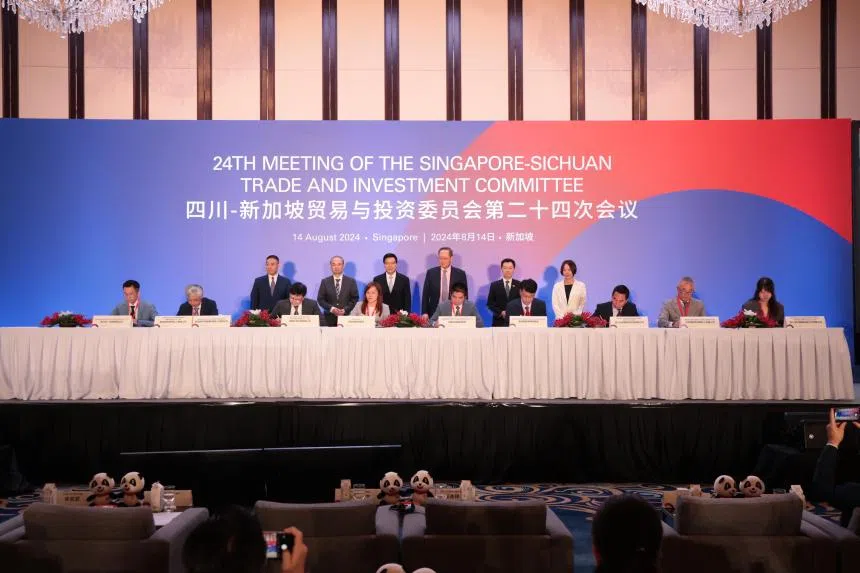FIRMS from Singapore and China’s western province of Sichuan have signed five agreements across a range of sectors to boost bilateral trade.
The memorandums of understanding (MOUs) signed at the 24th Singapore-Sichuan Trade and Investment Committee meeting on Aug 14 included businesses in utilities, healthcare and commodities trading, as well as those focusing on exchange and corporate training programmes.
One initiative involves local healthcare company Singapore Traditional Medicine joining Sichuan Youyi Technology to develop a smart medical consultation system featuring a digital human doctor, a listening and interpreting assistant, as well as tools for follow-up and chronic disease management.
Another signatory was Singapore utilities firm SP Group, which is teaming up with Chengdu Wuhou State-owned Capital Investment and Operation Group to develop an integrated energy management project in the Wisdom Valley, a high-tech industrial park housing 800 companies.
The new tie-up comes more than three years after SP Group joined hands with Wuhou’s district government to develop a smart-eco district.
SP group chief executive officer Stanley Huang said the firm is committed to supporting Sichuan’s transition to a low-carbon economy.
A NEWSLETTER FOR YOU
Friday, 8.30 am
Asean Business
Business insights centering on South-east Asia’s fast-growing economies.
“Our latest MOU builds upon our ongoing collaboration with the Wuhou district government to shape a smart and sustainable district,” he added.
“With the strong support of our local partners, we look forward to exploring future green energy opportunities in Sichuan.”
Total trade between Singapore and Sichuan grew by 15 per cent year on year in the first half of 2024, while Singapore’s investments into Sichuan increased by 7.9 per cent.
Singapore’s Second Minister for Trade and Industry, Tan See Leng, who co-chaired the Aug 14 meeting, told the event: “Sichuan is a natural landing pad for Singapore companies seeking opportunities in western China.
“Singapore companies remain interested to grow their businesses and provide value to Sichuan and the broader western China region, especially in future-oriented areas such as the green economy and cultural tourism sector.”
Tan also noted that green development and sustainability are global priorities in tackling the climate challenge, with Singapore and Sichuan well-positioned to establish a strong foundation for green trade in the region.
Both sides can leverage each other’s strengths to foster research and development collaborations and co-develop solutions to better harness renewable energy sources and low-carbon innovations, he added.
Tan highlighted Singapore’s increasing investment in low-carbon technology research, citing the National University of Singapore’s Centre for Hydrogen Innovations, which supports small and medium-sized enterprises in rapidly prototyping and testing low-carbon hydrogen technologies.
Meanwhile, Sichuan’s research institutes are advancing in the discovery and application of low-carbon hydrogen technologies in production and storage.
“With its wealth of renewable energy resources, Sichuan is developing a vibrant green economy powered by new energy and low carbon solutions,” Tan said.
“As a global trading hub, Singapore is also strengthening our approaches to facilitate regional green trade and enable companies globally to explore closer partnerships.”
Enterprise Singapore has noted that more Sichuan companies are exploring growth opportunities in South-east Asia to boost regional competitiveness and build capabilities. Around 50 Sichuan companies have set up offices in Singapore with an eye to expanding in the region.
Tan expressed hope that more Sichuan companies will follow suit: “In doing so, you could leverage Singapore’s conducive business environment and global connectivity and collaborate with trusted Singapore partners… to grow your footprint in South-east Asia and beyond.”
Sichuan’s gross domestic product grew by 6.0 per cent to reach six trillion yuan (S$1.1 trillion) in 2023. Total investment by Singaporean enterprises in Sichuan amounted to S$6.05 billion in the same year. THE STRAITS TIMES



